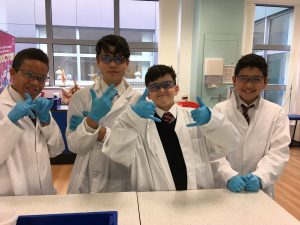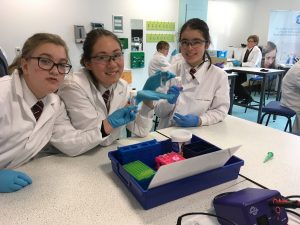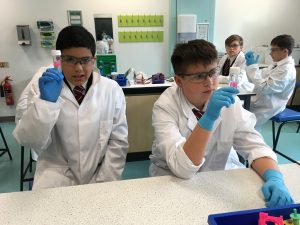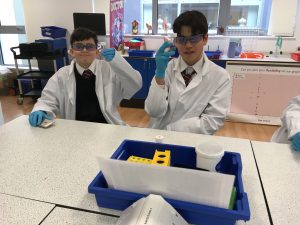Another busy week here at LifeLab: multiple school visits, supporting health awareness days and networking with a wonderful organisation to raise the profile of what we do, it’s been non-stop!
We have had the pleasure of meeting lots of enthusiastic students this week with pupils from secondary schools from Hampshire experiencing their LifeLab day here at our purpose-built education space in University Hospital Southampton.
Groups of students from St George school in Southampton and Thornden school in Chandler’s Ford got stuck into a range of experiments on their own health to reinforce the education messages around making the right choices in early life to protect your health in later life.
Alongside that our teaching fellow Dr Hannah Davey also visited Springhill school in Southampton to speak to primary school children about how they can keep healthy as part of our Early LifeLab project.
This week also saw two high profile awareness days around diabetes and COPD, both of which are issues covered as part of the LifeLab programme. Students discover what Type 2 Diabetes is, how you can test for it and what they can do to lower their risk of developing the condition. Similarly, the LifeLab experience also talks about the importance of keeping lungs healthy and what choices we can make to ensure they stay that way.
Meanwhile our programme leader Kathryn Woods-Townsend, research lead Professor Mark Hanson and Hannah had the pleasure of meeting the Worshipful Company of Information Technologists in London this week.
Over lunch Mark was able to outline the core aims of the LifeLab project and how its interventions with children and adolescents at a young age are tackling issues like childhood obesity. Mark talked about how it was important to engage with organisations like the WCIT who could support Lifelab’s endeavour to build in digital technology to the LifeLab programme, which would meet many educational, health and societal goals.
He ended by talking about LifeLab as our ‘gift’ to the next generation, by imparting what we know about how our early life choices affect the life course itself and the idea that by changing the beginning, you can change the whole story.
Kathryn says: “I always think it is a privilege to be able to share what we do with people in other organisations, businesses and communities to see how we can help in other.
“Combining our knowledge and ideas with other stakeholders is a great way of moving projects like ours forwards and raising the profile of what we are doing, and can all do, to improve the health of the next generation.”



